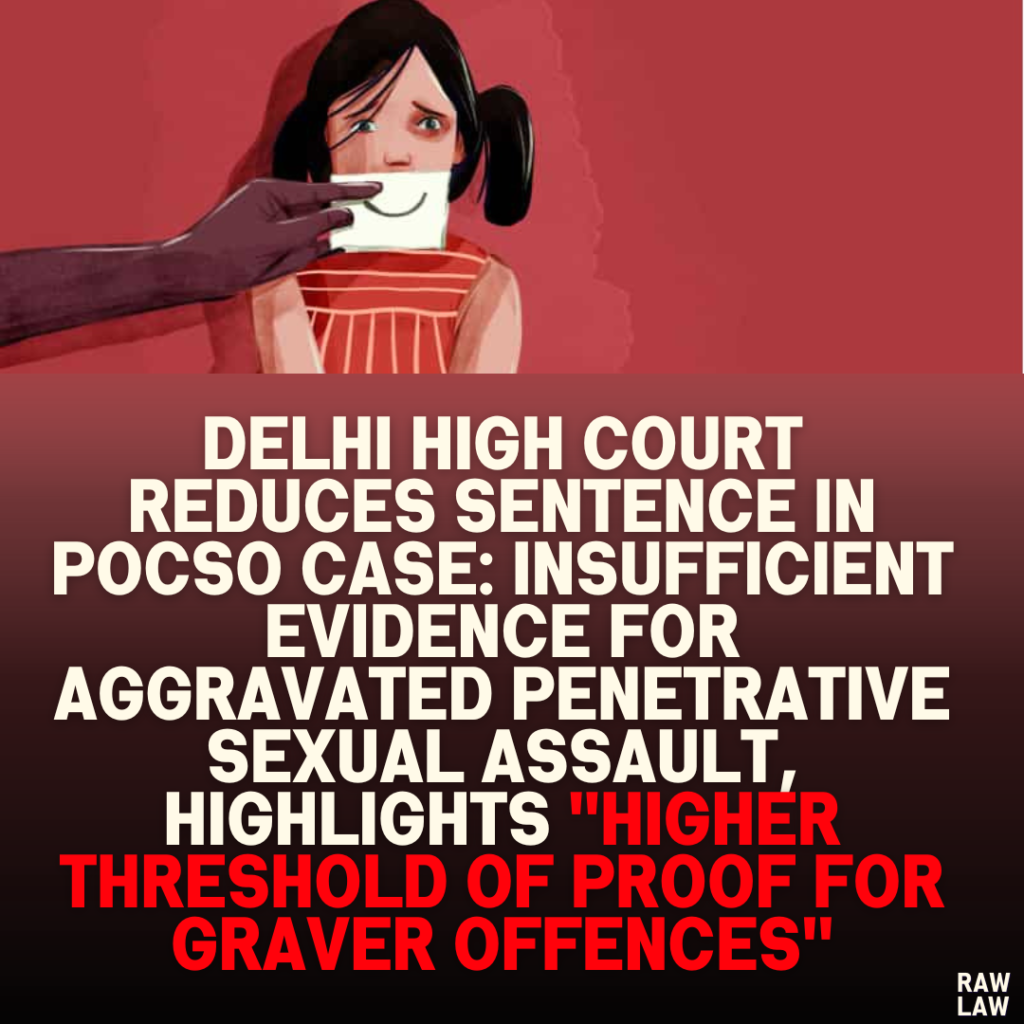Court’s Decision
The Delhi High Court modified the appellant’s conviction from aggravated penetrative sexual assault (Section 6 of the POCSO Act) to an attempt to commit such an offence (Section 18 of the POCSO Act). The sentence was reduced to 10 years of rigorous imprisonment and a fine of ₹5,000. The court found inconsistencies in the testimony of the prosecutrix and deemed the evidence insufficient to uphold the graver conviction.
Facts
- Background: The prosecutrix, a minor, alleged two incidents of sexual assault by the appellant in 2018.
- First Incident: Allegedly occurred at the appellant’s house.
- Second Incident: Allegedly occurred in the bathroom on the roof of the same building.
- Reporting: The FIR was filed after a delay of two months, raising questions about the timeline and the reliability of evidence.
- Medical Examination: The initial medical examination suggested an attempted sexual assault but lacked conclusive evidence of penetrative sexual assault.
Issues
- Was the prosecution able to prove the charge of aggravated penetrative sexual assault beyond a reasonable doubt?
- Did the delay in filing the FIR affect the credibility of the prosecutrix’s allegations?
- Did the testimony of the prosecutrix meet the legal standard of “sterling quality” required for conviction?
Petitioner’s Arguments
- Delay in Reporting: The two-month delay in filing the FIR made the allegations suspicious.
- Inconsistencies: The prosecutrix gave varying accounts of the incidents across multiple statements.
- Lack of Evidence: There was no corroborative medical or forensic evidence to substantiate the claims.
- Natural Human Conduct: The prosecutrix’s mother filed the complaint based on the accused’s wife’s statement rather than her daughter’s account, which was argued to be unnatural.
Respondent’s Arguments
- Victim’s Testimony: The prosecutrix’s statements, despite minor inconsistencies, were consistent on the core allegations.
- Age Factor: The victim was a minor (below 12 years), which invokes stricter legal presumptions under the POCSO Act.
- Presumption of Guilt: Under Section 29 of the POCSO Act, the burden was on the accused to disprove the allegations.
Analysis of the Law
- Presumption under POCSO Act:
- Section 29 of the Act allows the court to presume guilt if foundational facts are proved, but the prosecution must first establish those facts beyond doubt.
- Here, foundational facts like the prosecutrix’s age were undisputed, but inconsistencies in her testimony weakened the prosecution’s case.
- Credibility of Witness Testimony:
- The court applied the “sterling quality” test from Rai Sandeep v. State (NCT of Delhi). A victim’s testimony can solely convict if it is consistent, reliable, and unblemished.
- In this case, the prosecutrix’s testimony had material contradictions, including differences between her initial medical report and later statements.
- Role of Medical Evidence:
- The initial medical examination described the alleged acts as an “attempted sexual assault,” which contradicted later claims of penetrative assault.
- The lack of forensic evidence (e.g., clothing not submitted for examination) further weakened the prosecution’s case.
- Higher Threshold for Graver Offences:
- The court emphasized that for graver offences like aggravated penetrative sexual assault, the threshold of proof is higher due to severe penalties involved.
Precedent Analysis
The court relied on several precedents:
- State of Maharashtra v. Chandraprakash Kewalchand Jain: A victim’s testimony, if credible, does not require corroboration.
- Rai Sandeep v. State (NCT of Delhi): Defined the standard for “sterling quality” testimony.
- Ganesan v. State Represented by Inspector of Police: Highlighted the importance of corroborative evidence in cases where the victim’s testimony has inconsistencies.
Court’s Reasoning
- Inconsistencies in Testimony:
- The prosecutrix’s testimony changed across statements made to the police, the magistrate, and during the trial.
- Variations included details about the clothing she wore during the incidents and the nature of the alleged acts.
- Medical and Corroborative Evidence:
- The medical report indicated only an attempt at sexual assault, not penetrative assault.
- The absence of critical evidence, like the prosecutrix’s clothing, weakened the prosecution’s case.
- Prosecution’s Failure:
- The court criticized the investigation for not masking the identity of the victim, violating POCSO and Juvenile Justice Act guidelines.
Conclusion
The High Court concluded that the prosecution failed to prove the graver offence of aggravated penetrative sexual assault. The appellant was convicted for an attempt to commit the offence, and his sentence was modified to 10 years’ rigorous imprisonment.
Implications
- Victim Protection: Reinforces the importance of protecting the identity of child victims under the POCSO Act.
- Evidence Standards: Sets a high standard for evidence in cases involving severe penalties, ensuring convictions are based on robust proof.
- Judicial Prudence: Highlights the role of courts in balancing the rights of victims and accused, particularly in sensitive cases involving minors.
This judgment underscores the principle that while victims’ testimony holds significant weight in sexual offence cases, inconsistencies and lack of corroborative evidence can lead to the downgrading of charges.




Pingback: Bombay High Court: Arbitrator’s Jurisdiction Challenged; Non-Disclosure in Insurance Proposal Forms Under Scrutiny Amid Absence of Arbitration Clause in SBE Policy - Raw Law
Pingback: Delhi High Court Invalidates Unilateral Arbitrator Appointment; Appoints Independent Arbitrator to Ensure Fair and Impartial Arbitration in ₹2.05 Crore Loan Dispute - Raw Law
Pingback: Bombay High Court Upholds Public Status of Vahivat Road: Dismisses Claims of Exclusive Ownership, Citing Balance of Convenience and Irreparable Harm in Favor of Respondents - Raw Law